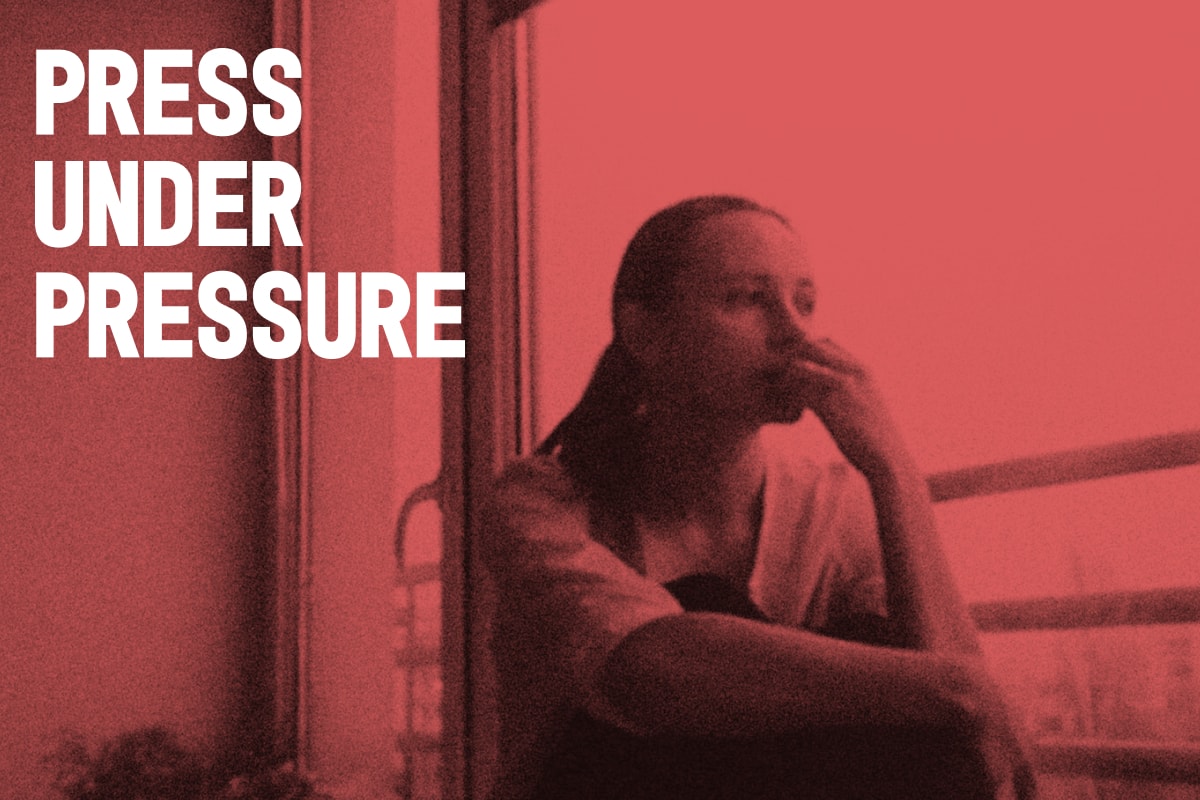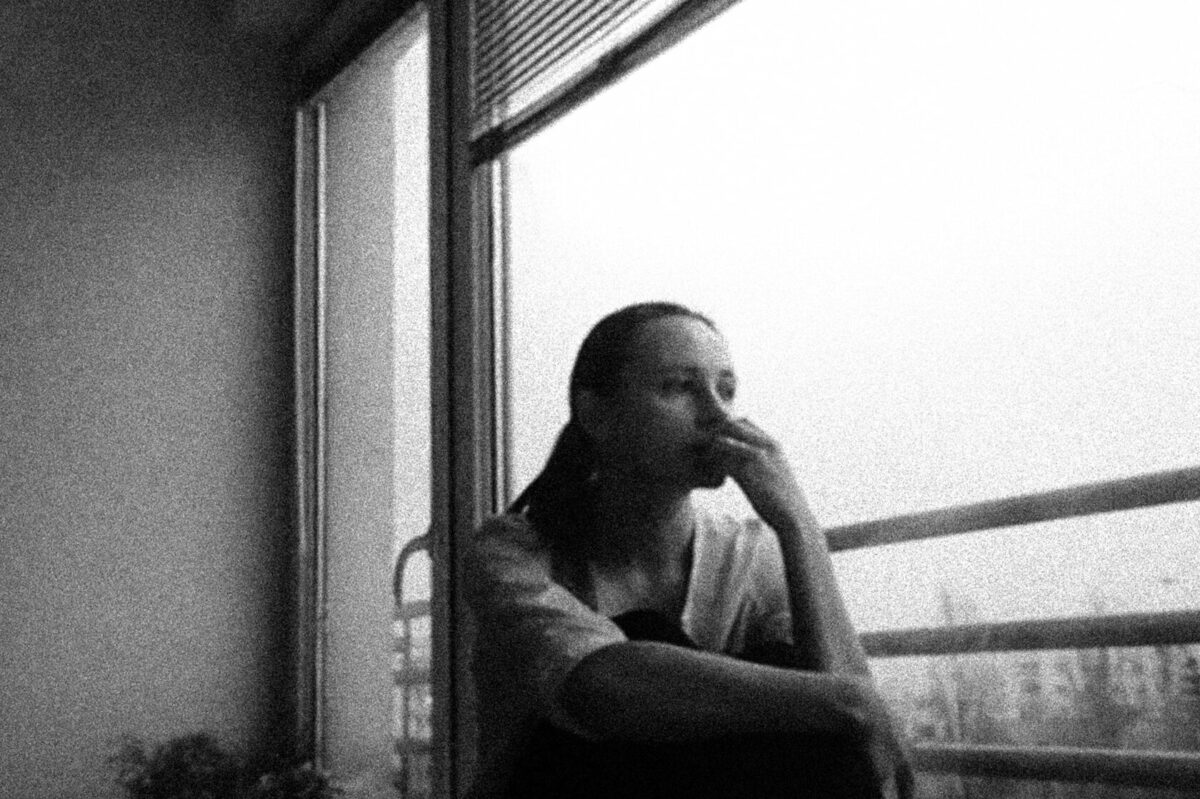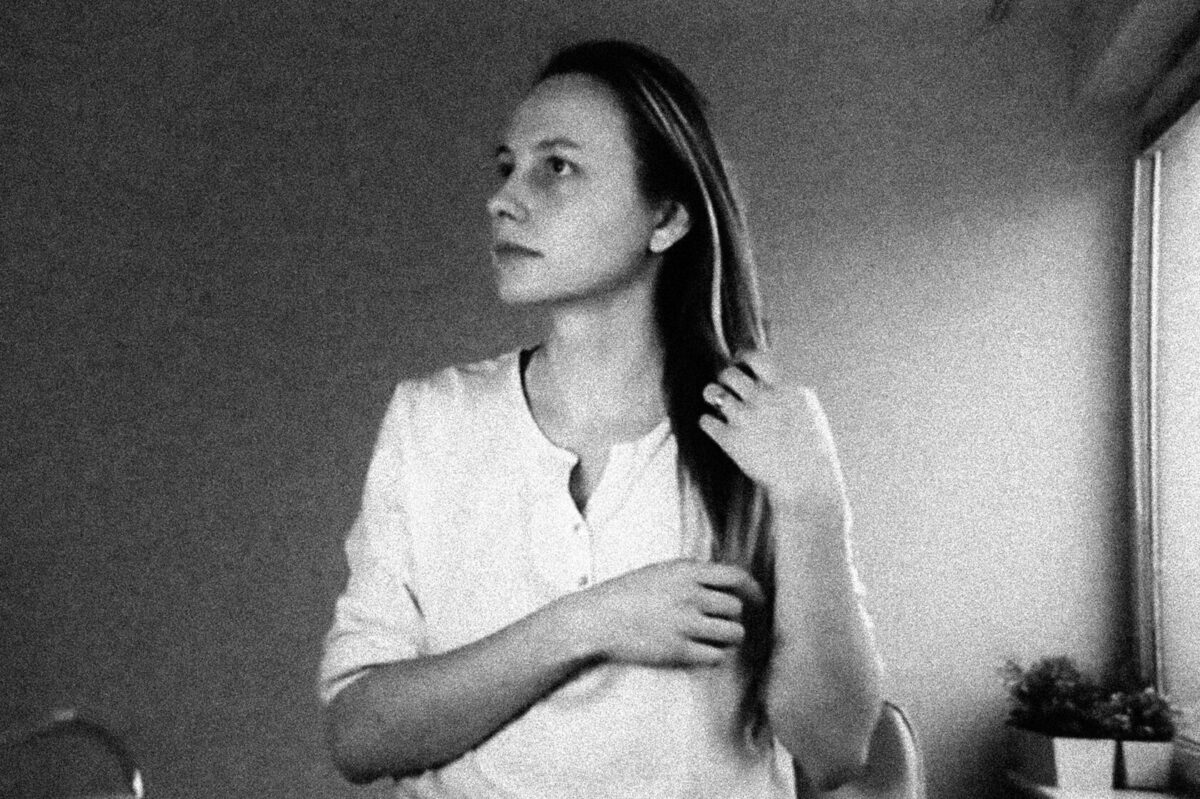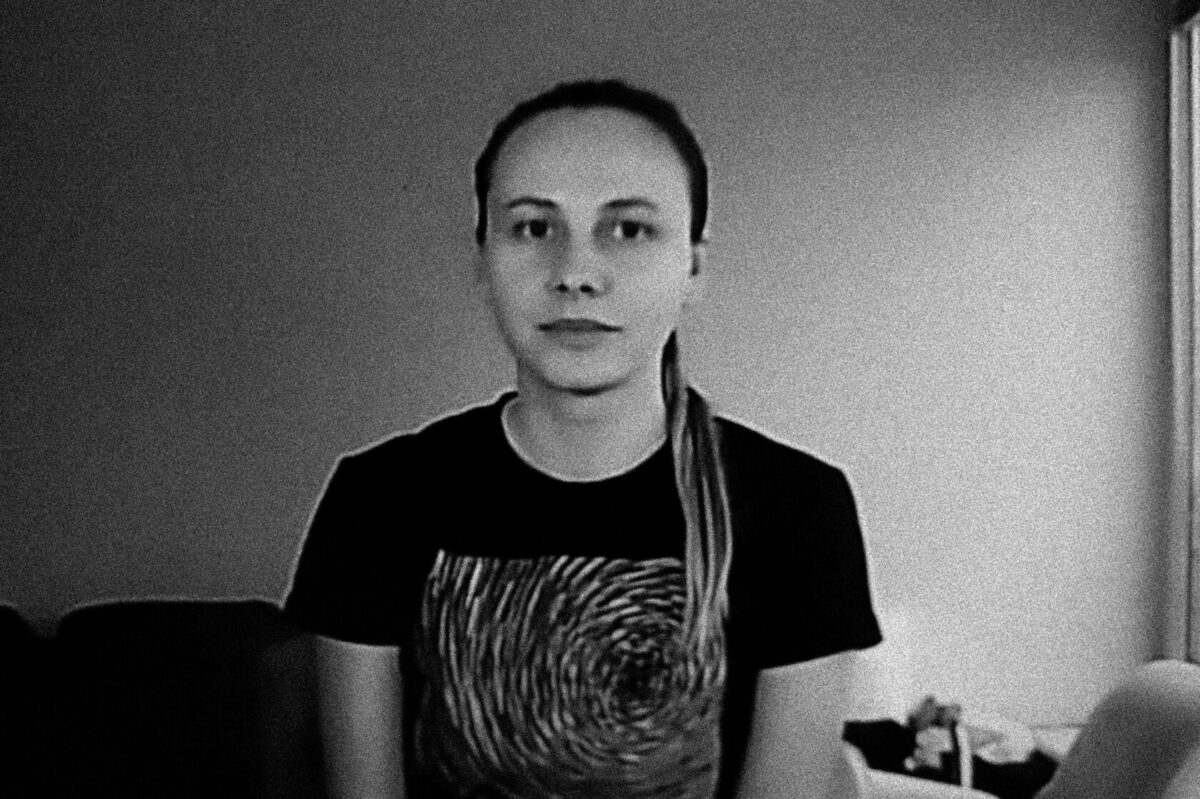
Since the end of summer 2020, a blue vest with «Press» marked on the back has become quite literally a shooting target in Belarus. The story of Iryna Arakhouskaya, a Belsat photojournalist, is the latest proof. On August 11, 2020 Iryna was covering a protest rally in Minsk when she was shot with a rubber bullet by security services. She was wearing a Press vest, and had her camera in her hands, but neither protected her from injury.
A few days later, Iryna submitted a statement to the Investigative Committee regarding her injury. A response came in 19 October 2020 — but in the form of a search at her flat. The journalist was now a witness in a criminal case under all three parts of Article 293 of the Criminal Code of the Republic of Belarus (Mass riots). According to the investigator, the status of witness is just ‘for now’; her status in the case in future will depend on what she has to say during her deposition…
It all started on 11 August. Before going to work, together with my colleague I went to buy a flak jacket and a helmet, protective equipment because it had already become clear that things had got serious and we needed protection: the hunt for journalists was on.
We went to take pictures near Pushkinskaya metro station, to the place where Aliaksandr Taraikousky had been killed. We left our car a bit farther off because everything was blocked near the metro, and there were no spots to park. People going the opposite way, from Pushkinskaya, warned us not to go there – journalists had had their cameras broken and their flash drives seized.

Iryna Arakhouskaya
We called our colleagues and they confirmed it: one had a flash drive brutally seized from him; the other one’s camera was struck after he refused to give the flash drive away. So we decided to head towards Spartyunaya metro station. There were already a lot of people and they had started to take to the road, waving flags. We were standing on a hill, taking photographs.
When it started to get dark, minivans suddenly arrived and people got out of them wearing uniforms with no insignia. But it was clear they were with security services, because they were carrying weapons. My colleague said we should run away. I saw that they were chasing us; they evidently had spotted us because we were identified with our blue vests, and were carrying cameras. I also had a helmet hanging beside me with the inscription «TV» on it.
And then they started firing at us. I looked back to make sure whether it was really us they were shooting at. And it was — several persons holding guns were after us. One of them was faster than the others and he opened heavy fire on us. And since I was the last one of our group, he hit me. At a certain point I felt pain in my coccyx or a bit lower. But I only groaned and kept on running: it did hurt, but not enough to make me stop. The only thing in my mind at that moment was to get away from there as soon as possible not to be shot again.
We ran alongside residential buildings and people were looking out the windows outraged: «What are you doing? They are journalists!»
We kept running until they left us alone. I examined myself later: there was no blood. The rubber bullet had gone through my backpack and left a hole in it. I had several layers of clothes on me: a vest, a sweater, trousers. They must have saved me from serious consequences. I was lucky. Instead of an open wound I got a large bruise.
We reached our car which was on the other side of the street, but it was impossible to leave: the area around us was blocked. Besides, they had started to disperse people harshly by setting off grenades. After we called several of our colleagues, it was clear cars were being stopped en masse and the passengers searched. Many were detained brutally. They would definitely discover us: we had cameras, flak jackets, helmets and Press vests…
So we parked near Kamennaja Horka metro station and decided to wait there.
We understood there was no way out, so we climbed up the round roof of one of the buildings there. There were three of us on that roof, me and two of my colleagues. And soon really violent activity kicked off nearby. A lot of police vehicles arrived. Security services were stopping cars coming from the ring road and started to drag people out of them… If we edit out the swear words of those security officers, their orders sounded like: «Trample them down!». They were beating people, shooting at cars. They left the cars destroyed right on the road and took people away.
We decided to stay on the roof and wait until it was over. And then suddenly something flashed above us. The other guys thought it was a star. But it turned out to be a drone. And I was not scared anymore: I was terrified. I felt cornered. For there was nowhere to go from that roof, and we were in plain sight. My colleagues were trying to take some photographs but I was just lying still, pushing myself onto the roof, willing myself to merge into it.
Then the drone left. And in a short while, something flashed above us again. But this time it was a real shooting star. It was a bizarre situation, a scary-romantic one: I had just been shot, yet I was lying on a roof watching the stars…

Iryna Arakhouskaya
After quite a long while, when everything became quiet and the police vehicles moved off, we took the courage to get down and return to our car. Suddenly, security officers appeared out of nowhere and ran towards us. There were trees, yet they were slim and small. It turned out other people were hiding behind those trees and scattered once they saw the security officers. So the officers focused on them. And we got in our car quickly and left.
I spent the next three days at home: I had a fever, felt really bad, could not work and unplugged myself from almost everything. But it was precisely during these days that events took place which, I think, still helped a lot of people to keep going. Women came out for a peaceful march against violence. But I didn’t see it: my memory was still filled with the horrors of 9-11 August. That’s why I’m sceptical instead of being inspired, to this very day, I’m sorry to say.
After those three days, I went to hospital No. 6 to be examined by a physician and have my injury recorded. At that time, people released from the Akrescina detention centre were filling the corridors of the hospital: beaten, swollen, marked with paint. I saw them close up, I saw them showing their wounds. It was horrible…
The medical staff were very sympathetic. They addressed everyone warmly as «kitten» or «sunshine». And there was a huge bouquet of white and red flowers in one of the rooms. I can’t describe how it looked altogether, those flowers and those injured people.
A physician examined me and warned there were two options: he could either describe my condition orally or record everything in writing which would lead to me being summoned due to a gunshot wound. I thought such a thing ought to be recorded whatever the consequences.
Three days later I received a phone call from the Investigative Committee saying (literally): «Hello! Would you like to make a statement against the riot police officers?» I even asked how they knew it had been riot police officers firing at me: it could have been anybody. No answer followed. That call was quite weird in general: the security service offering to take a statement against one of their own.

Iryna Arakhouskaya
Anyway, I decided to go to the Investigative Committee to make the statement. There were many other victims that day who also wanted to make their statements. Some of them were on crutches. At the entrance, there was a security officer in a flak jacket and a balaclava toting a machine gun. My first response was to leave – that gun again – and turned away. But I forced myself to return.
In one of the rooms, an investigator gave me a sheet of paper and said, «Write it down». I asked what exactly I should write because my lawyer told me they might try to talk me out of it. The investigator said, «Write your statement». So I did.
There was no response for two months. I only received some paper about a one-month extension of the term of enquiry. And on October 19, there was a search at my official place of residence, at my mother’s flat.
It happened that I was not in Belarus that day. I was working on a project about Belarusians who had been victims of violence by the security officers during August 9-11. Part of the photo shoot took place in the country, and part in Poland because so many have left Belarus, either for treatment or for safety reasons. When the search at my mother’s flat took place, I happened to be in Poland.
After the search, the news broke out that I was a witness under all three parts of Article 293 of the Criminal Code, as stated in the document they showed to my mother. Nothing was seized. But there was nothing much to seize anyway – I obviously don’t live in that flat.
My mother rang the investigator and found out that the search was related to my statement. She was stressed out and did not understand my status in the investigation. She was convinced I was the accused. She assumed they didn’t conduct searches at the homes of witnesses.
However, the investigator told my lawyer (to the letter): «She is a witness, for now». As the investigator explained, it all depends on what I have to say during the deposition.
The stories of the people whom I photographed for the project prove this possible. Many have made a witness statement just like me and after a while were re-qualified as suspects, or even the accused.
We’ve made a decision in my family that I will not return to Belarus in the immediate future. I will remain in Poland. We will see how events unfold in my case. The thing is that a colleague of mine who was also a victim in August received a notification of suspension of the case. She was not summoned, and there was no search. I hope to receive a similar notification. And then I will be able to return home.
Terms and conditions
Partial or full reprint is permitted subject to following terms of use.
An active direct hyperlink to the original publication is required. The link must be placed in the header of the reprinted material, in the lead or the first paragraph.
Reprints, whether in full or in part, must not make changes to the text, titles, or copyrighted photographs.
When reprinting materials from this page, attribution must be given to the Press Club Belarus “Press under Pressure” project, collecting evidence of repression against independent media and journalists in Belarus.